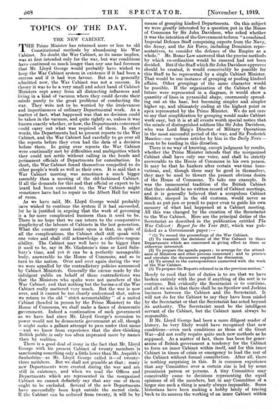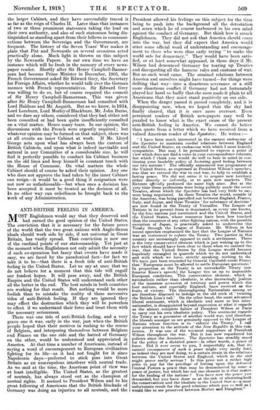TOPICS OF THE DAY.
THE NEW CABINET. THE Prime Minister has returned more or less to old Constitutional methods by abandoning his War Cabinet. No doubt the War Cabinet, as its name implies, was at first intended only for the war, but war conditions have continued so much longer than any one had foreseen that Mr. Lloyd George would probably have wished to keep the War. Cabinet system in existence if it had been a success and if it had won favour. But as is generally admitted now, the War Cabinet was not a success. In theory it was to be a very small and select band of Cabinet Ministers rapt away from all distracting influences and living in a kind of vacuum where they could devote their minds purely to the great problems of conducting the war. They were not to be worried by the irrelevances and impertinences of ordinary Departmental work. As a matter of fact, what happened was that no decision could be taken in the vacuum, and quite rightly so, unless it was known exactly whether, or how, the Departments concerned could carry out what was required of them. In other words, the Departments had to present reports to the War Cabinet, and the War Cabinet had carefully to go over all the reports before they even had the data of a decision before them. In going over reports the War Cabinet were continually met by difficulties and ambiguities which they could not settle without calling in the heads and permanent officials of Departments for consultation. In short, the War Cabinet found themselves compelled to do other people's work as well as their own. It is said that a War Cabinet meeting was sometimes a much bigger assembly than a meeting of the old-fashioned Cabinet. If all the demands for this and that official or expert to be heard had been consented to, the War Cabinet might sometimes have had to repair to the Albert Hall for want of room.
As we have said, Mr. Lloyd George would probably Gave wished to continue the system if it had succeeded, for he is justified in arguing that the work of governing Is a far more complicated business than it used to be. There is no hope that we can return to the comparative simplicity of the labours of Cabinets in the last generation. What the country must insist upon is that, in spite of all the complications, the Cabinet shall still speak with one voice and shall still acknowledge a collective responsibility. The Cabinet may well have to be bigger than it used to be, say in Mr. Gladstone's time or Lord Salisbury's time, and yet it can be a perfectly manageable body, answerable to the House of Commons, and so in turn to the nation. Over and over again during the war we were appalled by the contradictory policies announced by Cabinet Ministers. Generally the excuse made by the indulgent public on behalf of these contradictions was that the Ministers who spoke were not members of the War Cabinet, and that nothing but the business of the War Cabinet really mattered very much. But the war is now over, and it cannot be too clearly understood that, unless we return to the old " strict accountability " of a united Cabinet (headed in person by the Prime Minister) to the House of Commons, we shall make a fiasco of democratic government. Indeed a continuation of such government as we have had since Mr. Lloyd George's accession to power would not be democratic government at all, though it might make a gallant attempt to pass under that name —and we know from experience that the slow-thinking British public .is only too often impressed more by names than by realities.
There is a good deal of irony in the fact that Mr. Lloyd George with his present Cabinet of twenty members is sanctioning something only a little lower than Mr. Asquith's Sanhedrin—as Mr. Lloyd George called it—of twentythree meibbers. But we shall not grumble at that ; many new Departments were created during the war and are still in existence, and when we read the Offices and Departments which are represented in the reorganized Cabinet we cannot definitely say that any one of them ought to be excluded. Several of the new Departments have successfully been kept outside the sacred circle. If the Cabinet can be reduced from twenty, it will be by means of grouping kindred Departments. On this subject we were greatly interested by a question put in the House of Commons by Sir John Davidson, who asked whether it was the intention of the Government to form " a combined Imperial Defence Staff comprising experts from the Navy, the Army, and the Air Force, including Dominion representatives, to consider the defence of the Empire as a whole." Mr. Bonar Law answered that the precise methods by which co-ordination would be ensured had not been decided. But if the Staff which Sir John Davidson approves should be created, it would conceivably be possible for this Staff to be represented by a single Cabinet Minister. That would be one instance of grouping or pooling kindred affairs. Other groupings of the same character would be possible. If the organization, of the Cabinet of the future were represented in a diagram, it would show a quantity of lines in pyramidal shape, enormously spreading out at the base, but becoming simpler and simpler higher up, and ultimately ending at the highest point or apex represented by the Prime Minister. We do not care to say that simplification by grouping would make Cabinet work easy, but it is at all events worth special notice that the minds of distinguished soldiers like Sir John Davidson, who was Lord Ifaig's Director of Military Operations in the most successful period of the war, and Sir Frederick Maurice—see various articles by him in the Daily News-seem to be tending in this direetion. There is no way of knowingl except judgment by results, whether the Prime Minister intends that the reorganized Cabinet shall have only one voice, and shall be strictly answerable to the House of Commons in his own person. It may be that he hankers after certain war-time inno vations, and, though these may be good in themselves, they may be used to thwart the present obvious desire of the House of Commons. To take one example. It was the immemorial tradition of the British Cabinet that there should be no written record of Cabinet meetings, and it is generally believed that a scrupulous Cabinet Minister, steeped in the old customs, would never so much as put pen or pencil to paper even to guide his own memory of what had happened at a Cabinet meeting. All this was changed by the creation of the Secretariat to the War Cabinet. Here are the principal duties of the Secretariat as described in the publication entitled The War Cabinet : Report for the Year 1917, which was published as a Government paper : " (1) To record the proceedings of the War Cabinet.
(2) To transmit the decisions of the War Cabinet to those Departments which are concerned in giving effect to them or otherwise interested.
(3) To prepare the agenda papers ; to arrange for the attendance of Ministers and other persons concerned ; and to procure and circulate the documents required for discussion.
(4) To attend to the correspondence connected with the work of the War Cabinet.
(5) To prepare the Reports referred to in the previous section.".
Merely to read that list of duties is to see that we have broken entirely with the past if anything of the sort is to continue. But evidently the Secretariat is to continue, and all we ask is that there shall be no Spenlow and Jorkins business between the Cabinet and the Secretariat. " It will not do for the Cabinet to say they have been misled by the Secretariat or that the Secretariat has acted beyond its authority. The Secretariat must be the intelligent servant of the Cabinet, but the Cabinet must always be responsible. If Mr. Lloyd George had been a more diligent reader of history, he very likely would have recognized that new conditions—even such conditions as those of the Great War—did not really require quite such new methods as he supposed. As a matter of fact, there has been for generations of British government a tendency for the Cabinet to form an inner Cabinet within itself, and for this inner Cabinet in times of crisis or emergency to lead the rest of the Cabinet without formal consultation. After all, there is nothing surprising in this. It is common experience that any Committee over a certain size is led by some prominent person or persons. A tiny Committee may conceivably come to deCisions representing the equal opinions of all the members, but in any Committee of a larger size such a thing is nearly always impossible. Some historians have been making a hobby lately of tracing back to its sources the working of an inner Cabinet within the larger Cabinet, and they have successfully traced it as far as the reign of Charles II. Later than that instances of two or three prominent statesmen taking the lead on their own authority, and also of such statesmen being distinguished as standing apart from their fellows in communications between the Sovereign and the Government, are frequent. The history of the Seven Years' War makes it plain that Pitt and Newcastle on several occasions acted practically alone. Much light is thrown on this subject by the Newcastle Papers. In our own time we have an instance which will be fresh in the memory of every newspaper reader. Shortly after Sir Henry Campbell-Bannerman had become Prime Minister in December, 1905, the French Government asked Sir Edward Grey, the Secretary for Foreign Affairs, whether he would talk over the German menace with French representatives. Sir Edward Grey was willing to do so, but of course required the consent of Sir Henry Campbell-Bannerman. This was given after Sir Henry Campbell-Bannerman had consulted with Lord Haldane and Mr. Asquith. But as we know, in 1914, Lord Loreburn, Lord Morley of Blackburn, Mr. John Burns, and we dare say others, considered that they had either not been consulted or had been quite insufficiently consulted on a vital matter. Hence many tears. In our opinion, the discussions with the French were urgently required ; but whatever opinion may be formed on that subject, there was at all events an inner Cabinet at work. If Mr. Lloyd George acts upon what has always been the custom of British Cabinets, and upon what is indeed inevitable and natural in any Committee of a considerable size, he will find it perfectly possible to conduct his Cabinet business on the old lines and keep himself in constant touch with the House of Commons. On vital matters the whole Cabinet should of course be asked their opinion. Any one who does not approve the lead taken by the inner Cabinet can resign—it would be a good thing if resignation were not now so unfashionable—but when once a decision has been accepted it must be treated as the decision of all. In no other way can orderliness be brought back to the work of any Administration.







































 Previous page
Previous page